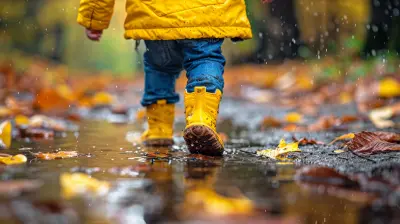Managing Criticism: Teaching Children to Handle It with Grace
1 April 2025
Let’s face it—criticism is an inevitable part of life. Whether it’s a harsh comment from a classmate, a tough assessment from a coach, or even gentle feedback from a teacher, kids are going to hear opinions about what they’re doing wrong. And let’s be honest, no one loves being criticized. But here's the thing: teaching kids how to handle criticism well is one of the most valuable life skills you can give them. It’s like giving them a toolkit for navigating challenges with poise and confidence.
So, where do we as parents step in? How do we help our little ones react to criticism with grace rather than frustration or tears? Let’s dive into some practical ways to help your kids embrace feedback (yes, even the not-so-nice kind) and turn it into a tool for success. 
Why Does Handling Criticism Matter?
Think about it—criticism doesn’t stop when childhood ends. Adults face it at work, in relationships, and everywhere in between. If kids can learn to manage it early on, they’ll be better equipped for life. Instead of crumbling under pressure, they’ll know how to reflect, improve, and grow.Plus, knowing how to handle criticism with grace can build resilience and self-esteem. Kids learn that their worth isn’t tied to someone else’s opinion. Instead, they’ll approach criticism with curiosity, seeing it as a way to improve rather than as an attack on who they are. 
Understanding Your Child’s Reaction to Criticism
Before we jump into strategies, let’s acknowledge that kids aren’t robots. Their reactions to criticism will vary depending on their temperament, age, and level of emotional maturity. Some kids cry, others lash out, and some retreat into their shells.Why is that? Well, criticism often triggers an emotional response. It’s easy to take it personally, especially when you’re young and still figuring out who you are. As parents, our job isn’t to make the criticism go away but to help our kids process it and respond wisely. 
Strategies for Teaching Kids to Handle Criticism
1. Model a Healthy Response to Criticism
Kids are like sponges—they absorb everything we do, even when we think they’re not paying attention. If you react to criticism with anger or defensiveness, guess what? Your child will likely follow suit.Instead, show them how to take criticism in stride. For example, if your boss provides constructive feedback during a work-from-home meeting, thank them and share how you plan to improve. Later, you can talk to your child about that experience and how you handled it.
2. Explain the Difference Between Constructive and Unkind Criticism
Not all criticism is created equal, and kids need help understanding the difference. Constructive criticism is meant to help, even if it stings a little. For example, “You did a great job, but next time, try to focus more on your spelling.” This type of feedback highlights areas for improvement without being mean.On the other hand, unkind criticism is often just plain rude. It’s the kind of comment that tears someone down rather than builds them up. Teach your child to recognize this and not take it to heart—sometimes, the issue lies with the criticizer, not the criticized!
3. Encourage a Growth Mindset
Ever heard of the growth mindset? It’s this amazing concept that focuses on the idea that abilities can develop with effort and learning. Basically, it’s all about saying, “I’m not great at this yet, but I can get better.”When your kid faces criticism, encourage them to see it as an opportunity to grow. If a teacher says their essay needs better structure, teach them to think, “Okay, I can learn how to organize my ideas better” rather than “Ugh, I’m terrible at writing.”
4. Help Them Pause Before Reacting
Let’s be real—our first instinct when someone criticizes us is usually to get defensive. Kids are no different. They might immediately snap back, cry, or say something they don’t mean.Teach them the power of the pause. When they hear criticism, they should take a deep breath and give themselves a moment to process. They can ask themselves, “Is this helpful? What can I learn from this?” By pausing, they’ll avoid reacting emotionally and have a chance to respond with grace.
5. Role-Play Scenarios Together
Role-playing might sound silly, but it’s such a helpful tool for kids. Sit down with your child and act out scenarios where they might face criticism. For example, pretend you’re their soccer coach giving them feedback on their performance. Then, guide them on how to respond politely and thoughtfully.The more they practice these situations at home, the better prepared they’ll be to handle them in real life. Plus, it can be a fun bonding activity!
6. Teach the Power of “Thank You”
Sometimes, the simplest response to criticism is the best one. Teach your child to say “thank you” when someone gives them feedback, even if it stings a little.For example, if a teacher says, “You need to spend more time practicing your math problems,” they can respond with, “Thank you for letting me know. I’ll work on that.” It shows maturity, and it helps diffuse any tension in the moment.
7. Build Their Confidence
Here’s the deal: kids who feel good about themselves are better able to handle criticism. If they already feel like they're "less than," even the smallest comment can feel crushing.Make it a point to build your child’s confidence regularly. Praise their efforts, celebrate their successes (big and small), and remind them of their strengths. When they know their worth, they won’t need others' opinions to validate them.
8. Teach Them to Move On
One of the hardest things about criticism? Holding onto it for way too long. Teach your child that once they’ve learned from criticism, it’s time to let it go.Use an analogy like a balloon—imagine the criticism is a balloon your child is holding onto. Once they’ve taken what they need from it, let the balloon go and watch it float away. No need to carry it around forever!
9. Be Their Cheerleader
Finally, remind your child that you’re always in their corner. When they face criticism, listen to how they’re feeling, and provide reassurance. Your love and support will give them the confidence to handle challenges head-on.
Criticism Isn’t the Enemy
At the end of the day, criticism isn’t something to fear—it’s just a part of life. With the right tools, your child can learn to see it as a stepping stone rather than a stumbling block.By modeling healthy responses, emphasizing a growth mindset, and helping them build confidence, you’re setting your child up for success. They won’t just handle criticism with grace—they’ll use it to thrive.
all images in this post were generated using AI tools
Category:
Building ConfidenceAuthor:

Zelda Gill
Discussion
rate this article
5 comments
Runevale Carey
Empower your children to embrace criticism as a growth opportunity, fostering resilience and grace in every challenge!
April 7, 2025 at 2:47 AM

Zelda Gill
Absolutely! Embracing criticism can be a powerful tool for growth, helping children develop resilience and learn valuable life lessons.
Capri McIlroy
Empowering kids to embrace feedback is essential.
April 6, 2025 at 5:03 AM

Zelda Gill
Absolutely! Empowering kids to embrace feedback not only fosters resilience but also enhances their growth and learning.
Sabina Griffin
This article offers valuable insights on helping children navigate criticism positively, fostering resilience and grace. A must-read for parents looking to build their child's confidence!
April 4, 2025 at 5:00 AM

Zelda Gill
Thank you for your kind words! I'm glad you found the insights valuable for fostering resilience in children.
Heath Whitley
What a wonderful article! Teaching our children to handle criticism with grace is such an important life skill. Your insights are incredibly helpful and remind us that it’s not just about what we say, but how we model resilience and kindness in our own responses. Thank you!
April 3, 2025 at 2:24 PM

Zelda Gill
Thank you so much for your kind words! I'm glad you found the insights helpful. modeling resilience and kindness is indeed key.
Faelan Johnson
Great insights! Encouraging kids to view criticism as a learning opportunity fosters resilience. Practicing role-play scenarios can also help them respond gracefully. Thank you!
April 2, 2025 at 3:37 AM

Zelda Gill
Thank you for your thoughtful comment! I'm glad you found the insights helpful. Role-play can indeed be a powerful tool in teaching resilience.




